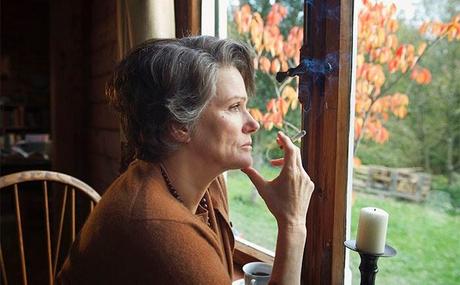 Intellectuals make difficult movie subjects. How does a director make thinking, writing and debating esoterica compelling? Margarethe von Trotta's Hannah Arendt (2012) provides a fine example. It depicts the passionate debate surrounding a prickly professor's views of totalitarianism.
Intellectuals make difficult movie subjects. How does a director make thinking, writing and debating esoterica compelling? Margarethe von Trotta's Hannah Arendt (2012) provides a fine example. It depicts the passionate debate surrounding a prickly professor's views of totalitarianism. Hannah Arendt (Barbara Sukowa) lectures at New York's New School in the early '60s, acclaimed for her book The Origins of Totalitarianism. The New Yorker asks her to cover Adolf Eichmann's war crimes trial in Israel. Arendt, herself a refugee from Nazi Germany, is immediately struck by Eichmann's evident blandness; he seems less monster than bureaucrat. Her subsequent articles on the "banality" of Nazi evil (published as Eichmann in Jerusalem) ignite an intellectual firestorm. Academics, politicians, Jewish leaders, even friends furiously attack Arendt, who's unbowed by remorseless criticism.
Hannah Arendt tackles a dense topic with admirable aplomb. Israel's extralegal abduction of Eichmann drew some criticism, yet most accepted it as a Nazi getting just deserts. Analysis of the Third Reich and its Final Solution then sought condemnation rather than understanding; witness William Shirer's The Rise and Fall of the Third Reich. Arendt's efforts to interject nuance earns scorn from all corners: she's savaged as a callous anti-Semite for granting Eichmann humanity. With forceful speeches and passionate direction, Von Trotta makes an essentially ivory tower debate engaging.
Inevitably though, Von Trotta and co-writer Pam Katz simplify the issues. Historians and sociologists still contest Arendt's thesis in both general and limited applications. Her argument that individuals abandon conscience for conformity is reasonable on paper, but can only work as a generalized thesis. Certainly Eichmann is a dubious example; co-chair of the Wannssee Conference, he joined Nazism less out of unthinking loyalty than conviction. And the movie barely explores Arendt's trickier condemnation of Jewish leaders for not resisting the Final Solution.
It doesn't help that Von Trotta depicts Arendt's opponents as oversensitive Jews or bullying pinheads. Hannah's besieged by disapproving deans, distraught friends and angry readers - even the Mossad pays her a visit. Yet none seems capable of understanding, let alone addressing her actual analysis. Even fellow academics offer little rebuttal beyond shocked expressions. At least some of Arendt's critics are more articulate and persuasive than the upstairs neighbor sending vulgar notes.
Hannah Arendt finesses such qualms with its protagonist. Hannah's certainly an engaging character: witty, brilliant, fiery in her self-assurance and passionate in defense. Yet Arendt's admirable qualities redound on her; what's appealing in one context becomes appalling in another. Her conviction leads her to dismiss dissenters as mere dolts. Arendt doesn't defend herself against charges of being cold or arrogant. Has she adopted the moral relativism of her mentor Martin Heidigger (Klaus Pohl)? Von Trotta here provides an ambivalence lacking in the overall debate.
Barbara Sukowa previously starred in Von Trotta's Rosa Luxemburg (1986), here giving an even more impressive performance. Shifting effortlessly between English and German, Sukowa imbues Hannah with an insouciant, playful mixture of humor and certainty. Arguing with friends or lecturing students, she's charming. On the defensive she's ferocious and protective, unwilling to give an inch. Sukowa makes Arendt without downplaying her less appealing aspects - a remarkable performance.
Sukowa's costars provide fine support. Janet McTeer plays novelist Mary McCarthy, Hannah's best friend; Axel Milberg as her exasperated husband; Nicholas Woodeson (Conspiracy) is William Shawn, the flinty New Yorker editor who backs Hannah throughout. The best supporting turns come from Ulrich Noethen (Downfall) as a contentious colleague, and Klaus Pohl's brief but vivid portrayal of Heidigger. Friedericke Blecht plays Arendt in several flashbacks.
Hannah Arendt can be criticized for framing its story as a genius besieged by philistines. But it's no crime for art to take sides in a debate, especially with Von Trotta's eloquence. Like its subject, Hannah Arendt provokes discussion and serious thought - no small achievement for any movie.

